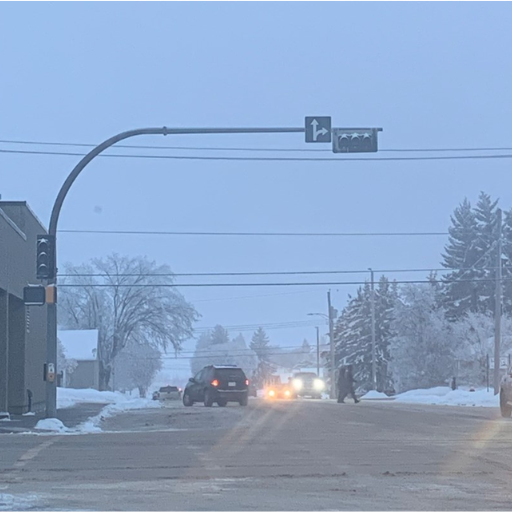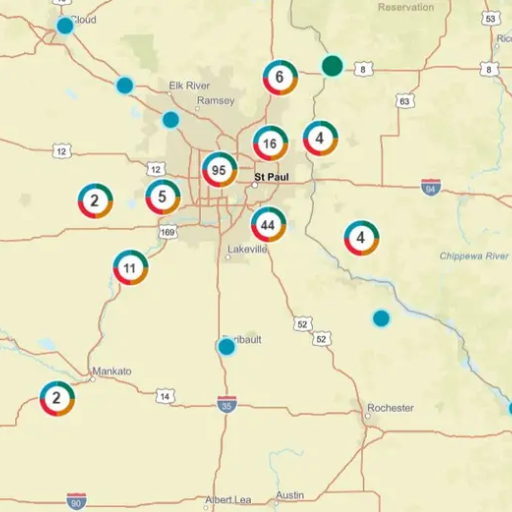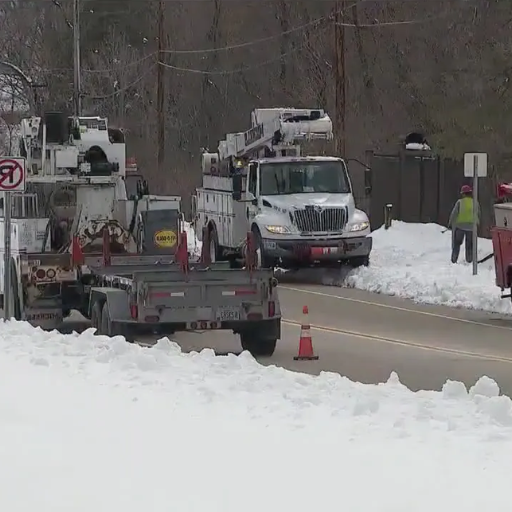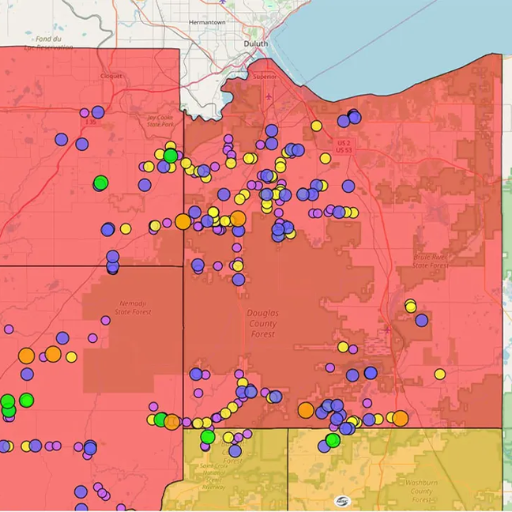Storms and other causes can interrupt power delivery, damaging daily life, business, and even safety. In St. Paul, outages have been on the rise lately, leaving many to question the causes and solutions. This comprehensive guide elaborates on the causes of these outages, their effects on the broader community, and the steps being taken to address these issues.
Leading Causes of Power Outages in St. Paul

Primary Factors
- Severe Weather: Storms with strong winds, heavy rains, or snow damage power lines and equipment. Lightning can also cause interference with the electrical system.
- Equipment Failure: Old infrastructure or aging systems collapse in local areas.
- Human or Environmental Interference: Construction accidents, vehicle collisions with utility poles, or fallen trees can damage power lines, causing outages.
Detailed Analysis of Common Outage Causes
Weather-Related Events
Extreme weather phenomena remain the leading cause of power outages nationwide. According to the U.S. Energy Information Administration, weather-related outages caused 83% of major power outages between 2000 and 2021.
| Weather Event | Impact Level | Typical Duration | % of Annual Outages |
|---|---|---|---|
| Thunderstorms | Moderate to High | 2-8 hours | 20-30% |
| Hurricanes | Severe | Days to weeks | Variable by season |
| Tornadoes | Catastrophic (localized) | Hours to days | Less frequent but severe |
| Ice Storms | High | Several days | Winter seasonal |
| Heatwaves | Moderate | Hours | Summer peaks |
Infrastructure and Maintenance Issues
Critical Infrastructure Statistics
70% of transmission lines are over 25 years old
60% of transformers are at or near designed lifetime
44% of grids have real-time monitoring capability
- Aging Power Lines: Most power lines were installed decades ago and are subject to corrosion and physical wear
- Transformer Failures: Heating and aging cause widespread outages when transformers fail
- Insufficient Renewable Integration: Current grid lacks flexibility for variable energy inputs
- Lack of Grid Modernization: Outdated systems lack advanced monitoring technology
- Vegetation Management: Untrimmed vegetation near power lines can initiate wildfires
Emerging Cybersecurity Threats
According to the 2023 Dragos report on industrial cybersecurity, there was a 15% increase in attacks against energy systems worldwide, with ransomware being the top threat.
Economic and Social Impact

Financial Consequences
Annual Economic Impact: Power outages cost the U.S. economy between $28 billion – $169 billion annually according to the U.S. Department of Energy.
Business Continuity Challenges
- Manufacturing Disruptions: 24/7 operations face significant losses during outages
- Supply Chain Bottlenecks: Delayed shipments and stopped production lines
- Data Integrity Risks: Average data center outage costs exceed $740,000
- Employee Productivity: 33-67% of workers struggle without power
- Customer Satisfaction: 68% of customers question brand loyalty after outage-related incidents
Health and Safety Concerns
⚠️ Safety Statistics
45% of companies experience degraded fire safety systems during power failures, according to a 2023 study. Medical facilities face the highest risk as ventilation systems and medical devices may be compromised.
Safety Guidelines During Power Outages

Emergency Preparedness Checklist
- Emergency Supplies: Flashlights, batteries, first-aid kit, non-perishable food
- Food Preservation: Keep refrigerator and freezer doors closed
- Generator Safety: Always operate outside, away from windows and doors
- Stay Informed: Use battery-powered radio for updates
- Avoid Hazards: Stay away from downed power lines and damaged appliances
Generator Safety Guidelines
Critical Safety Rules:
- Never operate generators indoors or in enclosed spaces
- Keep generators dry and away from electrical sources
- Never connect directly to house wiring without proper transfer switch
- Store fuel safely and never refuel while running or hot
Xcel Energy Response and Services
Current Restoration Status
Service Restoration Progress
95% of affected customers restored
200,000+ households and businesses initially affected
24-48 hours estimated for complete restoration
Xcel Energy Response System
- Proactive Monitoring: Smart grid technology provides instant alerts
- Rapid Deployment: Specialized repair crews ready for immediate response
- Customer Communication: Text, email, and online outage map updates
- Strategic Prioritization: Critical infrastructure restored first
- Continuous Upgrades: Ongoing infrastructure modernization
How to Report and Track Outages

| Reporting Method | Access | Best For |
|---|---|---|
| Online Reporting | XcelEnergy.com | Detailed problem descriptions |
| Mobile App | iOS/Android stores | Real-time updates and tracking |
| Text Alerts | Text “OUT” to designated number | Quick reporting and updates |
| Customer Service | 1-800-895-4999 | Complex issues and concerns |
| Automated Phone | Follow voice prompts | Quick reporting without wait |
Using the Electric Outage Map
The interactive outage map provides real-time information including:
- Outage locations by ZIP code or address
- Number of customers affected
- Estimated restoration times
- Cause of outage (when available)
- Color-coded markers for severity levels
Contact Information and Support

Xcel Energy Customer Service
- Emergency Hotline: 1-800-895-4999 (24/7 for power outages)
- Website: www.xcelenergy.com
- Mobile App: Available for iOS and Android
- Social Media: @XcelEnergy (Twitter), Facebook
- Live Chat: Available on official website
Community Support Centers
Xcel Energy maintains support centers in affected areas providing:
- Free water distribution
- Device charging stations
- Comfortable waiting areas
- Information and updates
References
-
Google Books – “Claiming the City: Politics, Faith, and the Power of Place in St. Paul”
This book provides a scholarly perspective on the historical and political context of St. Paul, which might offer insights into systemic vulnerabilities or historical precedents.
View Source -
Nnamdi Azikiwe University Repository – “Evaluation of the use of university library resources and services”
While this study focuses on library resource usage, it may provide methodologies or frameworks for evaluating service disruptions, which could be relevant to analyzing the St. Paul outage.
View Source -
Oxford Academic – “It was like a fever… narrative and identity in social protest”
This article explores narratives and identity in social contexts, which could be useful for understanding public reactions and narratives surrounding the St. Paul outage.
View Source
Frequently Asked Questions
How might I report an outage on St Paul?
Xcel Energy can be contacted by its outage hotline, online form, mobile app, or texting alert system. One can also check their outage map to determine whether outages in the area are already reported.
What should I do if I am notified of an outage?
Remain calm and check updates on Xcel Energy’s website or social media accounts. They will provide information concerning the cause and estimated restoration time.
Where is the electrical outage map?
The outage map is on the website and mobile app of Xcel Energy, showing real-time updates and detailed outage information.
Where do I go for assistance regarding frequent outages?
You would have to speak with Xcel Energy customer service to determine causes and discuss solutions for issues with frequent outages in your area.
Which energy company serves St Paul?
Xcel Energy is the biggest in the services of St Paul. Contact them by calling 1-800-895-4999 or visit their website for further help.
Service Performance Metrics
Average Restoration Time: 4.5 hours
Website Traffic: 2+ million monthly views
Customer Satisfaction: High ratings for mobile app and transparency
Looking Forward: Prevention and Preparedness
The combination of preventive maintenance, infrastructure upgrades, grid modernization, and investment in renewable energy resources will help communities better prepare for future disruptions. Residents should maintain emergency preparedness kits and stay informed about outage prevention and response procedures.
Key Takeaway: While power outages are inevitable due to weather and aging infrastructure, proper preparation, effective communication, and ongoing system improvements can minimize their impact on St. Paul residents and businesses.







